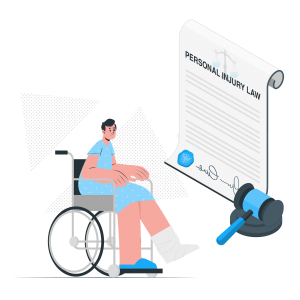The Hidden Risks: Unraveling the Legal Maze of Personal Injury in Business Contracts
In the complex landscape of business dealings, personal injury cases often take an unexpected turn when scrutinized through the lens of contractual agreements. While many individuals may assume that their rights in a personal injury incident are straightforward, the intricacies of business contracts can significantly impact the course of action one can take. This article seeks to unravel the legal maze surrounding personal injury in business contracts, shedding light on the hidden risks individuals may encounter and offer guidance on navigating this intricate terrain.
Contractual Impact on Personal Injury Rights
Whether explicit or implicit, business contracts play a pivotal role in shaping the rights and obligations of the parties involved. The impact of these contracts becomes particularly apparent when an injury occurs within a business setting. Many contracts contain clauses that address liability, indemnification, and waivers, elements that can significantly influence the ability of an injured party to seek compensation.
Liability Clauses: Allocating Responsibility
One of the key components of business contracts in the context of personal injury is the liability clause. These clauses define the extent to which each party is responsible for injuries that may occur on the premises or during the course of business activities. For instance, a lease agreement for commercial space may stipulate whether the tenant or the landlord bears responsibility for maintaining a safe environment.
Understanding and negotiating liability clauses is crucial for individuals looking to protect their rights. A well-drafted clause should clearly outline the responsibilities of each party, leaving no room for ambiguity. Individuals should be wary of contracts that attempt to shift an undue burden of responsibility onto them, limiting their ability to pursue a personal injury claim.
Indemnification Agreements: Shifting the Financial Burden
Indemnification agreements are another aspect of business contracts that can impact personal injury rights. These agreements outline the terms under which one party agrees to compensate the other for losses or damages incurred. In the context of personal injury, indemnification agreements may affect an injured party’s ability to seek compensation directly from the party at fault.
Individuals should carefully review indemnification clauses and assess whether they unfairly restrict their rights in the event of a personal injury. It’s essential to recognize situations where the indemnification agreement might shield the negligent party from direct legal action, potentially leaving the injured individual with limited recourse.

Waivers: Surrendering Rights or Enforcing Responsibility?
Waivers are legal documents that waive the right to pursue legal action in the event of injury. While waivers are commonly associated with recreational activities and events, they can also find their way into business contracts. Individuals signing contracts that include waivers may unwittingly surrender their right to seek compensation for injuries resulting from the negligence of the business.
However, not all waivers are ironclad. Courts may scrutinize these documents, particularly if they are ambiguous, unfairly one-sided, or against public policy. Individuals should be cautious about signing contracts that include waivers and, if possible, seek legal advice to determine the enforceability of such clauses.
Protecting Personal Injury Rights in Business Contracts
Given the potential impact of business contracts on personal injury rights, individuals must adopt a proactive approach to safeguard their interests.
Thorough Review and Legal Consultation
Before signing any business contract, individuals should thoroughly review all clauses related to liability, indemnification, and waivers. Legal consultation can provide valuable insights into the implications of these clauses, helping individuals understand their rights and potential limitations.
Negotiation for Fair Terms
Negotiation becomes a critical tool for securing fair and balanced terms when contracts seem overly restrictive. Businesses that are confident in the safety measures they have in place should be open to discussions that ensure the protection of both parties while avoiding undue hardship on the injured party.
Documentation and Evidence Gathering
Regardless of contractual agreements, individuals should prioritize documenting incidents and gathering evidence in the aftermath of a personal injury. This includes photographs, witness statements, and any relevant medical records. Strong evidence can bolster a case, even in the face of challenging contractual clauses.
Legal Action when Necessary
Individuals may need to explore legal action if all else fails, and contractual restrictions pose insurmountable challenges. A skilled personal injury attorney can assess the validity of contractual clauses, identify potential avenues for compensation, and navigate the complexities of litigation.
In the intricate world of business contracts, the fine print obscures personal injury rights. Understanding the impact of liability clauses, indemnification agreements, and waivers is crucial for individuals seeking to protect their rights in the event of an injury. By approaching contractual relationships with awareness and seeking legal guidance when necessary, individuals can navigate the legal maze and ensure that their rights are preserved and upheld, even in the face of complex business dealings.
Try our Debt Resolution solutions today Request a Demo
